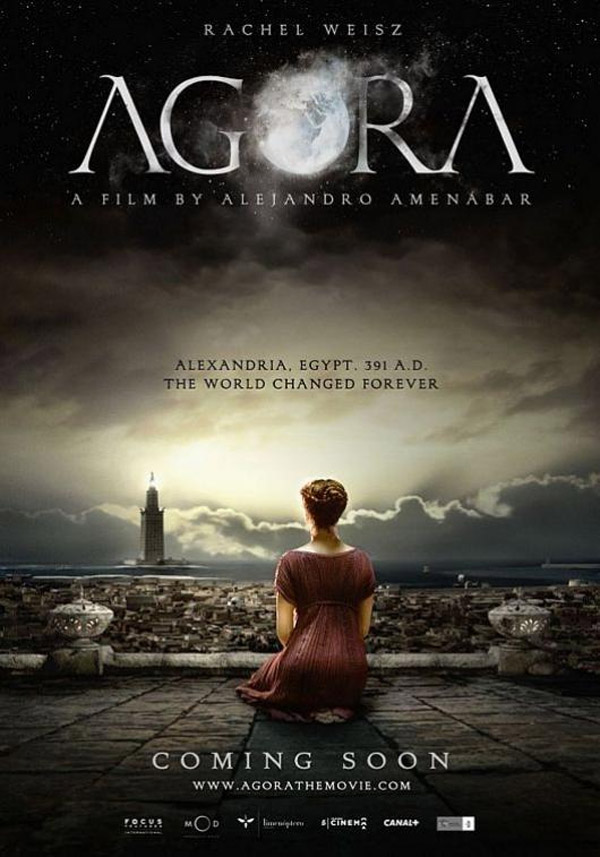directed by Alejandro Amenabar
starring Rachel Weisz, Max Minghella, Oscar Isaac
I don't know what kind of massive nerd it makes you if you cry at the sacking of the Library at Alexandria, but there you go.
Agora slipped under the radar here in the States. Filmed in Spain, it was both successful and praised, winning seven Goya awards - the Spanish equivalent of the Oscars - including Best Original Screenplay. Agora behaves differently from many epics about the Roman Empire. Philosophy is at the center of this film, and along with scientific thought, it is discussed at length. Much of its plot is speculation, but nothing it depicts conflicts with the historical facts that are known. There is plenty of fighting, but these battle sequences are not heroic or inspiring. There isn't much sex to speak of. Here, our focus remains on a single figure: a mathematician, astronomer, philosopher and teacher - and a woman.
Hypatia is perhaps the best representation of a female character I have ever seen on film. It is impossible for her gender to be invisible in this setting (4th century Egypt). Her father shakes his head at the idea of "marrying her off," insisting that answering to a man would kill her - she is lucky to have a curator for a father, who wishes her free. Hypatia herself, however, does not acknowledge herself as different from the male students around her. She dismisses their advances with nary a blink, keeping her focus on her passions of learning and discovery. I admire and thank the filmmakers for leaving unnecessary romantic subplots out of this story. Hypatia is adamantly a person by definition, not a gender - and not a religion, either.
With Christianity on the rise, the Empire is falling into fragments - Christian, Jew, and Pagan. Hypatia comes from the Pagan side of the pond, but she espouses no love for the gods, only the great works that the Greek minds have left behind. "You believe in nothing," the Christians attack. "I believe in philosophy," she maintains, and in that which she uncovers through inquiry. "You cannot question what you believe. I must." Unsurprisingly, this makes her a bit of a pariah in a world where everyone must take a side and violence has become the norm. The travels of the stars mean little to the men who attack her as a whore and a witch.
Which brings us to where I came in. The capacity of humanity for ignorance and destruction is perhaps no better exemplified than in the sacking of Alexandria's library. Here was the collection of all of the great thoughts of people gone before, the sum of the knowledge of civilization. The dead are gone. They cannot defend their works. To rip their legacy, the legacy of humanity, from their defenseless hands - to destroy it out of fear and spite - this is the darkness in the human soul. We like to think such blindness is behind us. I can only pray that we never stand at the brink as Hypatia did, staring at the impending thousand-year reign of the Dark Ages and desperately clinging to the stars.
Wikipedia Article on Hypatia
Wikipedia on the film's historical accuracy
Richard Carrier, PhD, on the film's historical accuracy

No comments:
Post a Comment